Papal conclave
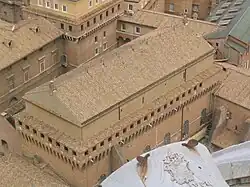
.jpg)

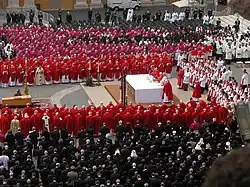
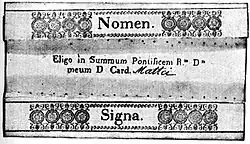
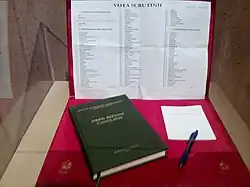
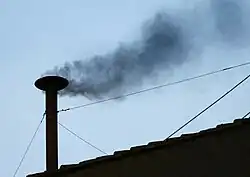
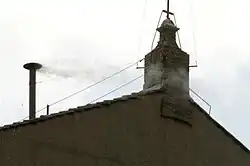
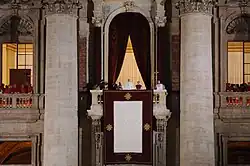
A papal conclave is a gathering of the College of Cardinals convened to elect a bishop of Rome, also known as the pope. Catholics consider the pope to be the apostolic successor of Saint Peter and the earthly head of the Catholic Church. It is the oldest historical method of electing a particular head of state (that is, for Vatican City) that remains in use to the present day. As of 2013, the regulations governing papal conclaves were established by Pope John Paul II in his 1996 apostolic constitution Universi Dominici gregis. In its introduction, John Paul II noted: "A careful historical examination confirms both the appropriateness of this institution, given the circumstances in which it originated and gradually took definitive shape, and its continued usefulness for the orderly, expeditious and proper functioning of the election itself, especially in times of tension and upheaval. Papal election is theoretically assisted by the Holy Spirit God, spirit of truth and love, which remains within the Church until the end of times (John 14,15).
Quotes
- He who enters the conclave as pope, leaves it as a cardinal.
- As quoted in Who will be the next pope? Here are some possible candidates, CNN World (April 22, 2025)
A
- (about Pope John XXIII) Not long after he was elected pope, John was walking in the streets of Rome. A woman passed him and said to her friend, "My God, he's so fat!" Overhearing what she said, he turned around and replied, "Madame, I trust you understand that the papal conclave is not exactly a beauty contest."
- Emily Antenucci and Carol Glatz, in "Jokes, quips, wisecracks: John XXIII lived with keen sense of humor" at Catholic News Service (24 March 2014)
C
- The Holy Father pointed out on one occasion that Latin America was preparing to reevangelize Europe and to evangelize other regions of the world; and he saw this as the plan for the region for the Third Millennium. Latin America is now a mature Church, ready to give a Pope to the universal Church, if not during this conclave, then during the next.
- I have borne the musket of a soldier, the traveller’s cane, and the pilgrim’s staff: as a sailor my fate has been as inconstant as the wind: a kingfisher, I have made my nest among the waves.
I have been party to peace and war: I have signed treaties, protocols, and along the way published numerous works. I have been made privy to party secrets, of court and state: I have viewed closely the rarest disasters, the greatest good fortune, the highest reputations. I have been present at sieges, congresses, conclaves, at the restoration and demolition of thrones. I have made history, and been able to write it. ... Within and alongside my age, perhaps without wishing or seeking to, I have exerted upon it a triple influence, religious, political and literary.- François-René de Chateaubriand, Le génie du Christianisme (1802), Preface (1833).
D
- The stringency of these regulations at once aroused opposition; yet the first elections held in conclave proved that the principle was right.
M
- Veni creator Spiritus
- Mentes tuorum visita
- Imple superna gratia
- Quae tu creasti pectora. [...]
- Accende lumen sensibus:
- Infunde amorem cordibus:
- Infirma nostri corporis
- Virtute firmans perpeti.
- Come, Holy Ghost, Creator blest,
- Vouchsafe within our souls to rest;
- Come with Thy grace and heav'nly aid
- And fill the hearts which Thou hast made. [...]
- Thy light to every thought impart
- And shed Thy love in every heart;
- The weakness of our mortal state
- With deathless might invigorate.
- Rabanus Maurus Veni Creator Spiritus (it is sung at the beginning of the papal conclave)
P
- We are moving toward a dictatorship of relativism which does not recognize anything as definitive and has as its highest value one's own ego and one's own desires.
- Joseph Ratzinger, Homily at St. Peter's Basilica before the conclave of cardinals (18 April 2005)
- While I am pleased to recall the long and dedicated service that closely bound your priestly and episcopal ministry to the Apostolic See, I would like in particular to express to you my deep appreciation for the great dignity and solemn sobriety with which you carried out your role as Camerlengo of Holy Roman Church, at the moment of the devout death of the late Pope John Paul II, on the occasion of the extraordinary demonstration of faith during the funeral of the beloved Pontiff, during the entire period of the Vacancy of the Apostolic See and in carrying out the tasks of the Conclave for the election of the new Pope. As your high office as Camerlengo and your other important offices in the various Dicasteries of the Roman Curia come to an end, I am sure that the memory of all the good you have done will be a comfort to you and a cause of thanksgiving and praise to the Lord.
Having a clear faith, based on the creed of the church, is often labeled today as a fundamentalism. … Whereas relativism, which is letting oneself be tossed and "swept along by every wind of teaching," looks like the only attitude acceptable to today's standards.
We are moving toward a dictatorship of relativism which does not recognize anything as definitive and has as its highest value one's own ego and one's own desires... The church needs to withstand the tides of trends and the latest novelties. ... We must become mature in this adult faith, we must guide the flock of Christ to this faith.
- Pope Benedict XVI. In a Homily of His Eminence Cardinal Joseph Ratzinger, Dean of the College of Cardinals, during a Mass at St. Peter's Basilica before the conclave of cardinals (18 April 2005)
- I am at best on the C list for Pope.
- Pope John Paul II. Remarks to journalists in August 1978, shortly before departing for the Conclave at which he was elected Pope, as quoted in In God's Name (1984) by David Yallop, Ch. 2 : The Empty Throne
- Yesterday, a funny thing happened to me on my way to the Conclave.
- Pope John Paul II. Address to the crowd in St Peter's Square (27 August 1978), the day after his election, as quoted in In God's Name (1987) by David Yallop, p. 132
R
- [Pope Francis has left] an immense legacy, placing the Gospel of Jesus Christ at the centre of the Church. [...] I read in his will that he offered all his sufferings to the Lord for peace. [...] [His successor] inherits a Church within which Pope Francis had initiated and opened up various processes, processes that deserve to be deepened and further accompanied. This was one of the pillars of Pope Francis' teaching: rather than occupying spaces, initiate processes. He initiated so many, and we hope that his successor will be able to accompany these processes for the missionary reform of the Church. [...] History teaches us that any prediction [about the duration of the conclave] is likely to be wrong because, in reality, it is the Holy Spirit who guides the Church; it is the Holy Spirit who guides the conclave. Therefore, the Holy Spirit will dictate the timing, and we entrust ourselves to Him.
- [Papa Francesco ha lasciato] un'eredità immensa, ha messo al centro della Chiesa il Vangelo di Gesù Cristo. [...] Ho letto nel suo testamento che ha offerto tutte le sue sofferenze al Signore per la pace. [...] [Il successore] eredita una Chiesa all'interno della quale papa Francesco aveva avviato, aveva aperto diversi processi, processi che meritano di essere approfonditi, di essere ulteriormente accompagnati. È stato uno dei pilastri dell'insegnamento di papa Francesco: piuttosto che occupare spazi, avviare processi. Lui ne ha avviati davvero tanti e speriamo che il suo successore possa accompagnare questi processi per la riforma missionaria della Chiesa. [...] La storia ci insegna che ogni previsione [sulla durata del conclave] rischia di infrangersi perché, in realtà, chi guida la Chiesa è lo Spirito Santo; chi guida il conclave, è lo Spirito Santo. Quindi, i tempi li detterà lo Spirito Santo e noi ci affidiamo a Lui.
- From an interview of Ignazio Ingrao to cardinal Baldassare Reina aired on TG1. As quoted in Domenico Vecchio, Don Baldo Reina al Tg1: “Esito incerto del conclave, ma l’eredità di Papa Francesco è viva” (in Italian; April 23, 2025)
- [Papa Francesco ha lasciato] un'eredità immensa, ha messo al centro della Chiesa il Vangelo di Gesù Cristo. [...] Ho letto nel suo testamento che ha offerto tutte le sue sofferenze al Signore per la pace. [...] [Il successore] eredita una Chiesa all'interno della quale papa Francesco aveva avviato, aveva aperto diversi processi, processi che meritano di essere approfonditi, di essere ulteriormente accompagnati. È stato uno dei pilastri dell'insegnamento di papa Francesco: piuttosto che occupare spazi, avviare processi. Lui ne ha avviati davvero tanti e speriamo che il suo successore possa accompagnare questi processi per la riforma missionaria della Chiesa. [...] La storia ci insegna che ogni previsione [sulla durata del conclave] rischia di infrangersi perché, in realtà, chi guida la Chiesa è lo Spirito Santo; chi guida il conclave, è lo Spirito Santo. Quindi, i tempi li detterà lo Spirito Santo e noi ci affidiamo a Lui.
Films
- Conclave: It was one of the oldest traditions in Christendom. Nowadays, because the outcome of conclave was usually known before it began, the process was criticized as obsolete—more of a burlesque than an election. The camerlengo knew, however, this was only a lack of understanding. Conclave was not an election. It was an ancient, mystic transference of power. The tradition was timeless… the secrecy, the folded slips of paper, the burning of the ballots, the mixing of ancient chemicals, the smoke signals.
See also
External links